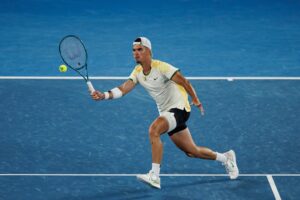It’s time for the final and, for many, the grandest Grand Slam of the year: The US Open. Set against the stunning backdrop of the Manhattan skyline, the second-oldest tennis tournament in history will be one for tennis fans to savor around the world. This year, the tournament has been blighted by high-profile withdrawals in the men’s draw, in addition to crowd-favorite Serena Williams still being out awaiting her first child. Despite these setbacks, this year’s US Open could be memorable. We could see a new star emerge in the more open lower half of the men’s draw, and we could also see a new women’s world #1 crowned. What’s more, even though issues off the court have dominated the pre-tournament build-up this year, there are still plenty of reasons why you would not want to miss this tournament for anything.
The History of the US Open
It is easy to forget, while admiring the aerial views of the modern, twenty-first century tennis centre in Flushing Meadows, that the US Open is the second-oldest tennis tournament in the world. The first tournament to be staged on US soil took place in 1881, and was won by Richard D. Sears. Sears would go on to win a record-equalling seven US Open titles, matched only by William A. Larned and William T. Tilden between 1881 and 1929. Jimmy Connors, Roger Federer, and Pete Sampras are each on five titles as things stand, and if Federer were to win at Flushing Meadows this year, he would edge ever closer to matching this impressive record.
The first ever women’s US Open Championship was played in 1887, and was won by then-17 year-old Ellen Hansell with a score of 6-1 6-0. Unfortunately, Hansell would not go on to match the likes of Sears, Larned, and Tilden in the men’s draw. She only claimed one title to her name, failing to defend her title the following year. The record for the total number of US Open victories is actually held by Molla B. Mallory, who claimed eight titles between 1915 and 1926. None of the current players in the women’s draw come close to matching this record, with Venus Williams coming closest with two titles to her name. The US Open’s rich history is second almost to none in the tennis world. This year, we should see a new generation of players looking to add to its legacy in their own specific way. If that’s not enough to get you interested, then I don’t know what is.
The Night Sessions
There is something truly special about the night sessions in Arthur Ashe Stadium. Just ask Andy Roddick. The 2003 men’s singles champion was king of the night session in New York, with most of his career US Open matches featuring after the sun had set. Another memorable match was Andre Agassi’s epic quarterfinal encounter with James Blake in 2005, which lasted until 1:15am local time. The night sessions have everything: great matches, an electric crowd, and a breath-taking setting. This year, the night sessions begin in sensational fashion, with women’s World #2 Simona Halep taking on 2006 champion Maria Sharapova. As well as this, throughout the fortnight we will be treated to the likes of Roger Federer, Rafael Nadal, Angelique Kerber, and Venus Williams gracing Arthur Ashe stadium after dark. Let’s get that popcorn ready!
Arthur Ashe Stadium
Some say it’s too big, too bulky, to be a tennis stadium. Such sentiments are naïve. Arthur Ashe stadium is everything that the US Open epitomises: glamour, modernity, and sheer awesomeness. Its $150 million retractable roof means that rain delays are now a thing of the past, and the size and steepness of its terraces create this cauldron-like effect, reminiscent of the Coliseum at the height of the Roman Empire. The stadium’s structure allows the crowd to influence matches more so than, perhaps, at any other tournament. Let’s think back to Novak Djokovic’s match point-saving return in his semifinal against Roger Federer in 2011, which enabled him to completely turn the crowd, and subsequently the match, in his favor. Arthur Ashe stadium is second-to-none for entertainment value. It is also a poignant tribute to one of the great sporting icons, serving, like Ashe himself, as an inspiration to us all in an era where the game seems to be moving towards a brighter, more inclusive future.






